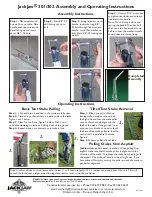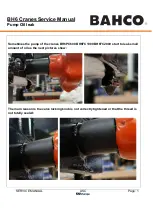
13
E
N
G
L
I
S
H
Warm-up phase : progressive effort
Warming up is a preparatory phase before any activity. It puts the person INTO
OPTIMUM CONDITIONS for carrying out his or her favorite sport. It is a METHOD
OF PREVENTING ACCIDENTS TO TENDONS AND MUSCLES. There are two
aspects : WAKING UP THE MUSCULAR SYSTEM, GENERAL WARMING UP.
1) The muscular system is prepared in a SPECIAL STRETCHING SESSION which
PREPARES FOR EACH ACTIVITY : each group of muscles is used, joints are used.
2) Global warming up gradually brings the cardiovascular and respiratory sys-
tem into action, improves irrigation of the muscles and prepares for making
efforts. It must be sufficiently long : 10 min for a leisure sport activity, 20 min
for a competition sport activity. Note that warming up must be longer : after 55
years old, in the morning.
Training
TRAINING is the main phase of your physical activity. You can improve your phy-
sical condition by REGULAR training.
• Anaerobie exercice to develop endurance.
• Aerobic exercice to develop cardio-pulmonary resistance.
Slowing down
This is the continuation of an activity at low intensity, the gradual “return to rest”
phase. SLOWING DOWN brings the cardiovascular and respiratory system, the
blood flow and muscles back to “normal” (eliminating the counter effects of an
exercice, such as lactic acids, the accumulation of which is one of the major cau-
ses of muscular pains such as cramps and stiff muscles).
Stretching
STRETCHING must follow the slowing down phase while joints are still warm in
order to reduce risks of injury. Stretching after an activity : minimizes MUSCULAR
STIFFNESS due to an accumulation of LACTIC ACIDS, “stimulates” BLOOD
CIRCULATION.
C
C A
A R
R D
D II O
O -- T
T R
R A
A II N
N II N
N G
G
• Exercise from 80 to 90% and
beyond : Anaerobic zone and red
zone reserved for high performan-
ce and specialised athletes.
• Exercise of 70% to 80% of the
maximum cardiac rate :
Endurance exercise.
• Exercise from 60 to 70% of the
maximum cardiac rate : Getting
fit / favourable consumption of
fat.
• Exercise from 50 to 60% of the
maximum cardiac rate :
Maintenance /Warm up.
WARNING, TECHNICAL INSET
WARNING TO USERS
You must work towards getting fit in a controlled
manner.
Do no hesitate to consult a doctor before any
physical activity, especially if : you have not
practiced any sports activities in recent years,
you are more than 35 years old, you are not sure
about your health, you are following medical
treatment.
CONSULT A DOCTOR
BEFORE PRACTISING ANY SPORT.
A
B
C
D
C A R D I O - T R A I N I N G E X E R C I S E
Cardio-training exercise is a form of aerobics (conditioning the body in the presence of oxygen) and allows you to improve your cardio-vascular
capacity. To be more precise, you will improve the tonicity of the heart and your blood vessels. Cardio-training exercise carries the oxygen breathed
in from the air to your muscles. It is the heart that pumps this oxygen through the body and, in particular, to the muscles being exercised.
C O N T R O L L I N G Y O U R H E A R T B E A T
P H A S E S O F A P H Y S I C A L A C T I V I T Y
It is vital to measure your pulse periodically in order to control your
degree of exercising. If you do not have an electronic measuring
device, follow this procedure :
To take your pulse, position two fingers : on the neck, or below the
ear, or at the inside wrist beside the thumb.
Do not press too hard : excessive pressure reduces the blood flow
and can slow down the heartbeat. After counting the pulsations for
30 seconds, multiply by 2 to obtain the number of pulsations per
minute.
Example : 75 pulsations counted in 30 seconds corresponds to a
heart beat of 150 pulsations per minute.
200
195
185
190
180
175
170
165
160
155
20
60%
70%
80%
100%
60%
50%
70%
80%
100%
25
30
35
40
45
50
55
60
65
160
156
148
152
144
140
136
132
128
124
140
136
129
133
126
122
119
115
112
108
120
117
111
114
108
105
102
99
96
93
100
97
92
95
90
87
85
82
80
77
50%
Exercise range
Beats per minute
Age

























